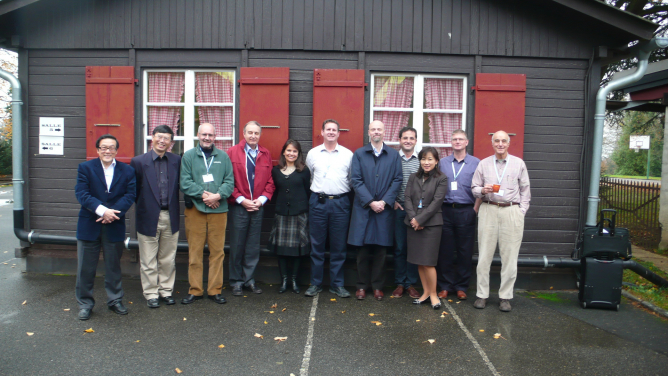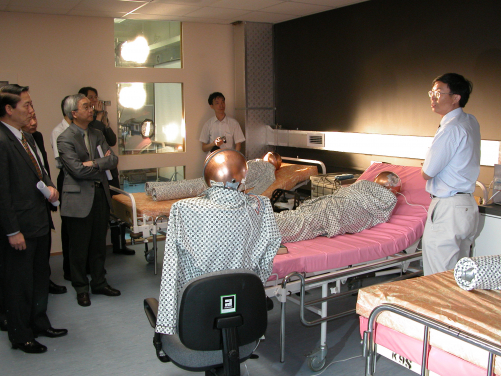Media
HKU Engineering Professor Yuguo Li receives ASHRAE Holladay Distinguished Fellow Award
25 Aug 2021
Photo taken on Jul 17, 2003 at Princess of Wales Hospital 8A ward in investigation of the ward ventilation and particle diffusion route

Professor Yuguo Li (second from left) Photo taken in 2008 with a group of experts from the World Health Organization in Geneva for writing the first Manual for Natural Ventilation Infection Control for Healthcare Setting
- 1 / 5
- 2 / 5
- 3 / 5
- 4 / 5
- 5 / 5
Professor Yuguo Li, Chair Professor of Building Environment at the University of Hong Kong’s Department of Mechanical Engineering, has been honored the Louise and Bill Holladay Distinguished Fellow Award 2021 by The American Society of Heating, Refrigerating and Air-Conditioning Engineers (ASHRAE), in recognition of his contributions and pre-eminence in engineering and research work.
ASHRAE, founded in 1894, is a global society advancing human well-being through sustainable technology for the built environment. The Society and its members focus on building systems, energy efficiency, indoor air quality, refrigeration and sustainability within the industry. Its ventilation and thermal comfort standards are the most adopted worldwide in air conditioning and ventilation design.
As one of ASHRAE’s most prominent awards, the Holladay Distinguished Fellow Award is given to one Fellow or sometimes not given at all each year. Professor Li was named the 2021 recipient of the Award at the ASHRAE Virtual Annual Conference on June 29, and is the only ASHRAE Fellow from an Asian country receiving the Award since its initiation in 1979.
Professor Li became an ASHRAE Fellow in 2006. Of the about 50,000 ASHRAE members today from over 132 nations, only about 800 have been elevated to Fellows.
In his acceptance speech on June 29, Professor Li said: “I am very honoured to be presented with the Louise and Bill Holladay Distinguished Fellow Award. The knowledge that I acquired in Shanghai, Beijing and Melbourne on fluid dynamics and ventilation allowed me, together with my talented students and postdoctoral researchers, to uncover more about airborne transmission-induced infection following the 2003 SARS epidemics. It has been very satisfying work applying our knowledge in understanding more about the pandemic since early last year. My former and present students have made continuous contributions in the area of indoor transmission of SARS-CoV-2. I wish to thank them for their wisdom, passion and in sharing the intellectual journey with me.”
Professor Li is an expert in ventilation of indoor environments with a focus on environmental transmission of diseases. During the SARS epidemic in 2003, in collaboration with epidemiologists, Professor Li and a group of mechanical engineering experts at HKU identified the airborne transmission route of SARS-CoV-1 in explaining the main infection pattern and characteristics of the outbreak at Amoy Gardens and at Ward 8A of the Prince of Wales Hospital. Their work provided the first evidence of airborne route of the coronaviruses, and has been widely used for infection control. The combined engineering and medical approach has since been adopted in many engineering studies on the occurrence of respiratory infection.
Since early 2020, Professor Li and his virology and epidemiologic collaborators have conducted a series of epidemiological and environmental studies on more than 15 important COVID-19 outbreaks in Hong Kong, Mainland China and Tokyo. They revealed the key role air ventilation played in an outbreak in indoor environment. The team also provided the first study on airborne transmission in a restaurant in Guangzhou, the only study to date with the most complete environmental and human contact data. Their work led to the hypothesis of the predominant short-range inhalation route of SARS-CoV-2. The hypothesis was accepted by the World Health Organization in late April 2021. Their work also led to the discovery of the ‘chimney effect’ in relation to the vertical transmission of the COVID-19 virus in 10 outbreaks involving high-rises in Hong Kong.
More about Louise and Bill Holladay Distinguished Fellow Award
https://www.ashrae.org//File%20Library/Membership/Honors%20and%20Awards/Louise-and-Bill-Holladay.doc
About ASHRAE: https://www.ashrae.org/
Media enquiries:
Ms Celia Lee, Faculty of Engineering, HKU (Tel: 3917 8519; Email: leecelia@hku.hk) or
Mr Heng Cheng, Faculty of Engineering, HKU (Tel: 3917 1924; Email: hengc@hku.hk)

